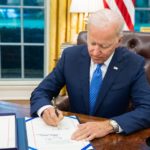During his confirmation hearing on Wednesday, President Joe Biden’s nominee for a federal trial court position, Kato Crews, faced challenging questions from Senator John Kennedy (R-La.) that left him stumped.
Crews, who has been nominated as a district judge for the U.S. District Court of Colorado, was asked by Kennedy to describe his approach to analyzing a Brady motion. Crews admitted that he had not yet encountered a Brady motion during his four and a half years as a judge.
After stumbling over the answer, Kennedy asked Crews if he, in fact, even knew “what a Brady motion is,” according to Fox News. Crews, who is currently a magistrate judge, confessed that the concept didn’t come to mind as he had never dealt with the matter before.
“I believe that the Brady case involved something regarding the Second Amendment,” Crews responded. “I have not had an occasion to address that.”
It’s not clear what Crews was referring to, but it could have been the Brady Handgun Violence Prevention Act of 1993 was enacted, which amended the Gun Control Act of 1968. The Brady Law imposed as an interim measure a waiting period of 5 days before a licensed importer, manufacturer, or dealer may sell, deliver, or transfer a handgun to an unlicensed individual.
But Kennedy was actually inquiring about a Brady motion, which is a legal term that arose following the significant Supreme Court ruling in Brady v. Maryland in 1963. The case established that the prosecution is obligated to disclose any potentially favorable evidence to the defense.
It was the second instance this year in which Senator Kennedy perplexed a judicial nominee for Biden during the confirmation hearing, with the first happening less than two months ago. In that instance, the Louisiana senator questioned Charnelle Bjelkengren, a Spokane County Superior Court Judge, about the details of Article V of the Constitution.
“Tell me what Article V of the Constitution does,” Kennedy asked Bjelkengren during that earlier hearing. “Article V is not coming to mind at the moment,” she said in response.
Article V lays out the constitutional process for amending the nation’s founding governing document, which can be done by Congress passing amendments or by a convention called by a requisite number of states for the purpose of proposing amendments. In both cases, proposed amendments must be ratified by the legislatures of three-fourths of the states.
“Kennedy then asked Bjelkengren about Article II, with the nominee again responding that the article did not come to mind,” Fox News reported.
Article II describes the powers and authorities vested in the president as head of the Executive Branch.










